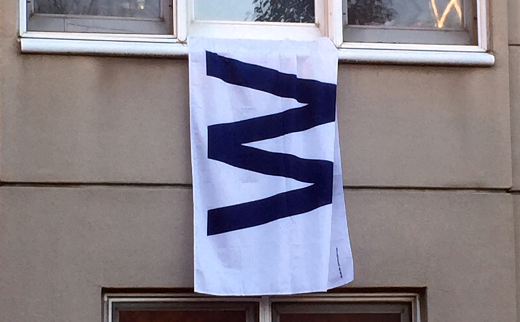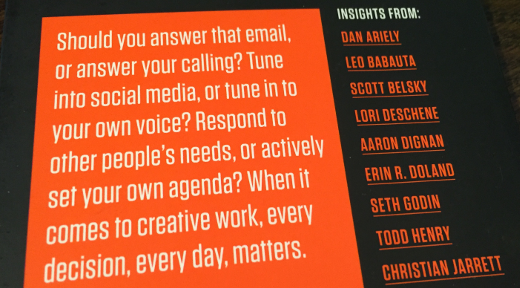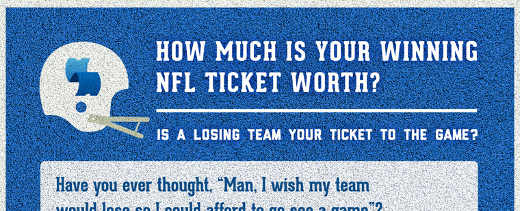My Takeaways from Poetry Magazine March 2017
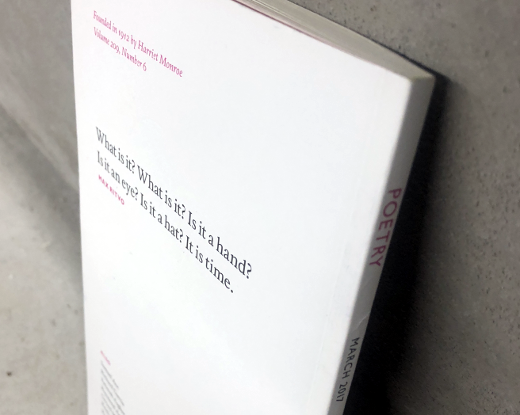
As my personal exploration into the world of writing continues, despite the infrequency you may notice here on this little blog, I have been reading more literary publications. These have included various Web sites, plus I continue to read December magazine’s biannual publications. Though I don’t put pen to paper as much as I’d like to, I am gaining inspiration for when I do through the works of others.
I happened upon a copy of Poetry Magazine a while back in a doctor’s office waiting room. Where I had heard about the century-plus year old poetry magazine, I had never read a copy. As the March 2017 copy before my eyes was in good company with other outdated periodicals in the seating area, I took it upon myself to put this edition to good use and literally took it. When I finally got to curl up with the paperback magazine, I not only moved forward with it on my creative journey, but I also took a fresh look back as well. I share those with you as my takeaways.
My knowledge of poetry is grade-school basic – If you’ve read The Hot Iron over time, it would come as no surprise that I spent more time in the computer lab than in any classroom. As a result, liberal arts classes like English and language never got the attention, years later I realize, they should have. When I think of a poem, I think of Dr. Seuss or the Man from Nantucket. Granted I have read some poetry in recent years in December magazine, after reading a pure poetry publication I realized my learning about this literary style ended around middle school.
The more I read the more I enjoy it – There are a wide variety of styles of poetry, some close to what I remember from school with meter and rhyming, and others where for me it’s hard to follow the formatting and subject of the poem. But as with many things, the more you are exposed to it, the more you will like it.
Learning that relates to you means more to you – The March 2017 edition of Poetry Magazine closes with what is called “Comment” which itself is not poetry, but rather a dialogue on poetry. Among the different poems, poets and styles the author of this piece discusses includes Stopping by Woods on a Snowy Evening, a poem by fellow New Englander Robert Frost. This was a poem I remember from childhood, mainly due to said geographic affiliation as well as the last lines of the poem which were planted in the back of my head back then, “And miles to go before I sleep, And miles to go before I sleep.“ After reading this in the final pages of the journal, it helped round out what I have been reading and experienced now with something I read and experienced many years ago.
Poetry Magazine is a periodical you can subscribe to or find at higher-end newsstands (if there is even one by you). Their Web site has a wealth of poetry to explore and read, and they also offer a Poem of the Day newsletter. With our inboxes filled daily with things we don’t want to read, it’s nice to have an interesting diversion among the unwanted refuse. As I pass along all that I have read, I neatly placed this copy of Poetry Magazine among some newspapers on the table of the coffeeshop where I wrote these takeaways. Perhaps someone else will learn something as they fulfill the promises they keep.
This is from The Hot Iron, a journal on business and technology by Mike Maddaloni.
Did you enjoy this? Subscribe to The Hot Iron by RSS/XML feed or Read by Email.
Book Take-Aways • Diversions • (2) Comments • Permalink
All I Really Needed To Know In Life I Learned In College Radio
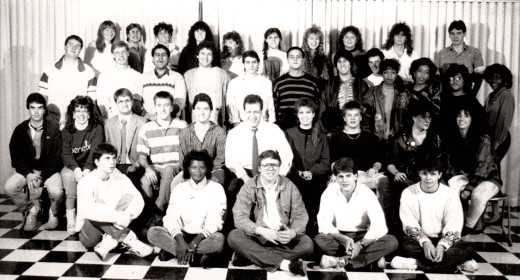
After a while, memories of college tend to be more nostalgic than educational. Especially for someone like myself who graduated over a score ago, most of what I specifically learned in the classroom in my coursework is a faded memory. But college is so much more than the courses you take and the grades you get. The life experiences, formal and informal, tend to stay with us for a long time, as college tends to be the place where we first invent or reinvent ourselves.
When I found out in a roundabout way that my college radio station, WNEK-FM in Springfield, Massachusetts, went off the air as a broadcast station and became a purely Internet streaming station, it made me sad. Thinking about my 4 years at Western New England College, the school that held and later dropped the broadcast license, I realized I learned more within the walls of the radio station than I did in any classroom.
Of course I Iearned much in my coursework at the school better known by its acronym, WNEC. But it was my involvement in its college radio station that not only served as a true training ground for me, but offered me challenges and opportunities I couldn’t have possibly got from any professor in any class.
It’s hard to summarize my total college radio station experience in one post of reasonable length, so here’s highlights of what my radio broadcast days taught me.
Leading vs. Managing … Your Friends No Less – In addition to being a broadcast station, my college radio station was the largest, most-active club on campus, with well-over 75 students, faculty and staff between on-air DJs and off-air support. This is where I cut my teeth for the first time in a leadership role, having to lead, encourage, manage and discipline station members, many who were my friends. Sometimes lines were crossed and I had to take unpopular stands my senior year when I was the station’s General Manager, not their friend Mike. What I learned here I took into managing my first post-graduation work projects and teams.
Surround Yourself with the Right People – Within such a large club, there was a smaller core number of people whom I considered confidants in helping me effectively run WNEK-FM. Some were board members holding other roles such as program director, music director, etc., and others were DJ’s and off-the-mic support. They helped me think through tough decisions, and their points of view were invaluable to me.
This group that surrounded me was not a finite group that never changed. Over the years, students would come and go, and new people would join and, over time, become trusted advisors. As much as I had a good group, I was always looking to see who else could contribute, a task all leaders should be doing.
True Cultural Diversity – Most people who were involved in the radio station were there with common interests, namely music and broadcasting, and as you could guess these interests crossed all races, creeds, colors, sexual orientations, economic backgrounds, geographies, et. al. As a result we had the most diverse student organization on campus.
For someone like myself who grew up in a predominantly white, Christian, middle-class town, looking back I didn’t really think about it at the time; these people were simply my friends. I learned not to judge someone by what they looked like – the person with the mohawk and black leather was no different than the one in polo shirts and khakis. As I grew and entered the real world, I cherished I was exposed to and learned to appreciate this diversity.
Do Your Homework – It may not come as a surprise that someone as myself, who has worked in technology my entire career, spent most of my academic time in the computer lab. But here I am not talking about my computer class homework, rather the homework needed to be the best DJ and broadcaster.
I learned this the hard way when I interviewed Civil Rights leader Julian Bond who was speaking on campus. Back then there was no Web to lookup his Wikipedia profile (in case you’re curious, the concept of the Web wasn’t published until my senior year in college), but I didn’t even walk over to the library to look up something on him or get more information from our school’s PR department who arranged the interview for me. This was clear when I opened the interview with Bond saying he is a current Georgia state senator to which he quickly corrected me. Needless to say, I did a facepalm in my mind, then sucked it up and continued the interview.
Networking Early and Often – Networking for me started small, and as I saw others reaching out to me I did my own outreach and found many win-win situations.
An alumni of the radio station and college came back and asked me if he could be substitute DJ, which many alumni who lived near campus did. Over the course of the year I offered him a few shows when others couldn’t make their own. When I heard a certain New York City developer was going to be at a local game manufacturer for the launch of an eponymous board game, knowing this alumni worked there I asked if I could cover it for the radio station. As the one-time news director for the station I did cover local, high-profile stories in the past. When I reached out to him if I could get a press pass, he said not only could I do that, but as he was the product manager for the game, I would be invited with the other press on a tour of the plant and lunch in the executive dining room afterwards. As you might have guessed, the developer was Donald Trump, the game maker was Milton Bradley, and the rest, as they say, is history. Video proof can be found in this news clip I recorded on VHS tape then and posted to YouTube. Incidentally, the college radio station exposed me to another 2016 U.S. Presidential candidate. The son of Bernie Sanders handed me a radio station application; at the time his Dad was the mayor of Burlington, Vermont. As a native New Englander whose family was from Vermont, I knew of his father well, before many around the country would decades later.
Though I never knew for sure, another case of networking may have come in handy as well. Over the course of an overnight softball marathon on campus, some DJs were caught by campus police with alcohol in the studios. The campus police were unlocking the doors for the morning DJ, who just happened to be the Academic Vice President for the college, who did not know the station would be occupied at that hour. After the incident I was paraded before the associate dean of students who, as judge, jury and executioner, ordered the radio station off the air indefinitely (something he threatened to do a lot). However it never happened, and I was given a stern warning and said we would remain on the air. Again I don’t know what he said or did, or if he did say anything at all, but did the Academic V.P. say something, perhaps to the college president whose office was next to his, that may have reversed this? I don’t know, and I never asked. Over the course of the year I got to know the V.P. well, as he reached out to me when he first came to campus the summer before as he tried and failed to get a radio station at his last school. He was a great friend of the station, and when he expressed interest in doing an early Sunday morning radio show, a timeslot we could never get a student to fill for obvious reasons, it worked out to be a great win-win. Especially, perhaps, when this situation came up.
There’s no substitute for real, practical experience – A lot of my hands-on approach to, well, just about everything I do was nurtured greatly at the college radio station. Covering the explosion of the Space Shuttle Challenger my freshman year taught me how to work together as a team when things were moving fast and not all of the information was available. That was later reinforced when I spent the day shadowing the news director of a local radio station. And there’s no better way to learn you’re not prepared for everything than engineering the broadcast of a college hockey game in a sparsely attended, freezing cold hockey rink, and the equipment failed and the broadcast never happened. All of these things happened well before my official, academic internship the summer before my senior year, and taught me much, much more.
The role of music in my life – Prior to signing on the air my freshman year, I had a limited range of musical tastes, and probably even less appreciation for it. Spending 4 years on a radio station that literally exposed me to every genre of music, coupled with experiencing it through and with others, brought this appreciation to a great height. Maybe that’s why I work best with ambient sound surrounding me rather than silence. Today I still enjoy almost all music, but 80’s alternative rock still holds a special place in my heart, and ears.
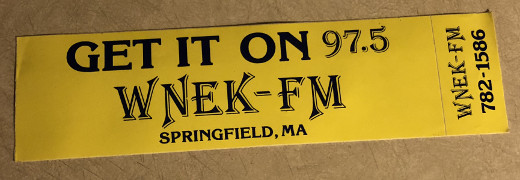
Deconstructing My College Radio Experience
When I first signed up for my college radio station, I had no idea what impact it would have on my life. Immersing myself with a great cast of people allowed me to try, fail, succeed and learn to degrees I couldn’t get in the classroom. Passion of course played a great part of this. Where I was and am passionate about my chosen career path in computer technology, the foundation for the successes – and failures – I have had in my career were built on a well-rounded foundation of both my classroom and broadcast radio education. Whether or not the school took something like this into consideration when they decided to drop the broadcast license, I have no idea.
This is from The Hot Iron, a journal on business and technology by Mike Maddaloni.
Did you enjoy this? Subscribe to The Hot Iron by RSS/XML feed or Read by Email
Diversions • (0) Comments • PermalinkStir The Soul
Congratulations to the Chicago Cubs for winning the 2016 World Series, ending a 108-year championship drought! As a fan of the Boston Red Sox, who ended their own 86-year drought in 2004 – ironically just after I moved from Boston to Chicago – there has always been a kindred spirit between the teams, and I am glad to see them win it all.
As I watched the final out of the game – at home, after leaving the pub where several families and their kids stayed far too late on a school night – I heard the jubilation in the neighborhood of literal screams and shouts. I was happy for the team and Chicago, especially for friends and colleagues – loyal fans who have been waiting for “next year” to finally come.
Though I was happy, I can’t say I was emotional about it. Granted, it was after midnight, but the strong feeling I have experienced when others of my teams – the Red Sox, New England Patriots and even my adopted Chicago Blackhawks – won their championship titles was just not there.
That is, until I saw this. Click on the embedded video below to play it, or click this link to watch the video on YouTube.
The video is from Budweiser and was released on the morning after the game. It is an extremely creative piece, combining modern video of Chicago and its fans watching the game and vintage video and audio of the late legendary Cubs announcer Harry Caray, edited to match the final out of the game. It’s as if Caray was alive today, making the call himself.
This got to me. And I finally felt the emotion I would expect to feel, as I have felt in the past when not only a team of mine won, but for other exciting events in my life.
Why it got to me is not surprising. As someone who grew up in an age before ESPN (interestingly, ESPN founder Bill Rasmussen was a local sports reporter where I grew up before he started the cable network) and the ability to see games all the time, we may have gotten 1 or 2 games a week on TV, but radio was where all games were broadcast. In those days, play-by-play announcers had a much different style than they do today; they were much more conversational, and in the absence of today’s computer-generated bombardment of stats, filled gaps with anecdotes that gave you a broader sense of what it was like to be in the ballpark.
Where I knew about Harry Caray and his antics in Chicago, for me it was Ken Coleman who was the play-by-play announcer for the Red Sox. An older gentleman, his mellow voice was a contrast to today’s announcers, and it was like listening to old Uncle Ken telling the story of today’s game.
To say they don’t make them like that anymore is more than cliché. Where Coleman, as Caray, did not see a World Series for their teams in their lifetimes, it was nice that this tribute to Caray was crafted.
(Edited 7/9/2017 and 7/30/2018 - changed link and embed from the original video to an alternate one as it was no longer available.)
This is from The Hot Iron, a journal on business and technology by Mike Maddaloni.
Did you enjoy this? Subscribe to The Hot Iron by RSS/XML feed or Read by Email.
Announcements • Blogging • Diversions • Thrive • (0) Comments • Permalink
My Takeaways From The Book Manage Your Day-To-Day
So, how is your day going?
Whenever asked that question, or just now as you read it, you may have begun it with a sigh or groan, or some insincere sense of enthusiasm. As much as we can plan days and focus on whatever we need to do, there are plenty of factors working against us and disrupting our momentum. These disruptors will never go away, and our only choice is to try to bring elements in to manage or counter them.
When I heard about the book Manage Your Day-To-Day: Build Your Routine, Find Your Focus and Sharpen Your Creative Mind I said to myself, “self, how can I pass on reading this?” The book is a collection of writings and interviews with 20 “creative minds.” Where some I have heard of, like Seth Godin and Tony Schwartz, most of the rest I had not. Yet each of the contributors were very intriguing, yet practical. Manage Your Day-To-Day is a good read that gets you thinking about your own routines and practices and how to get the “most” from them, whatever “most” means to you.
As I read the book, my takeaways from it were not from the specifics of the book, rather from its big picture, and are as follows.
Misery loves company, but only if you want to be miserable together – As I read the dozen pieces from the 20 authors, nobody was saying that they have overcome chaos and their lives are exactly as they want them. Yet they did admit to challenges and offered both general and specific advice on how they are conquering what challenges them.
You deserve a break today – How many times have you been working on something and someone asks you about lunch, and you are thinking, “gee, I just had breakfast!” (Ok, you can put your hands down now.) I have written man times here at The Hot Iron about the creative process – or if you are so inclined, simply thinking – and the need to get away to change the scenery, recharge the brain and come back with a fresh focus.
In my current role, in the employee handbook for my firm it actually mentions taking breaks during the day just for that reason. As a matter of fact, I am writing this very blog post on one of those breaks. And on the way to the Starbucks where I am writing this, I was able to easily think through something for work that my brain kept tripping on. Where I thought I dropped the ball on something, I actually did not, and completely followed through. A nice thought to have in my head as I return to the office.
Where was Scrum? – As I read this book after reading Jeff Sutherland's book on Scrum, using Scrum would be a perfect way to help you manage the creativity. As a matter of fact, I recently setup my own scrum board for myself, with tasks such as writing this blog post and fixing the closet doors in my kid's bedroom.
I recommend Manage Your Day-To-Day for anyone who is looking for ideas and encouragement on improvement of their productivity or just to add some calm into their lives. This book is one I bought myself after reading about it somewhere – sorry, I forgot, as I have had the book for a while. As I always pass along books, for this one I placed it on a shelf in the kitchen of my office with other books people have left there as a mini-library. It will be interesting if anyone takes it, and even more so if they took it after reading this blog post!
Have you read Manage Your Day-To-Day? I welcome your thoughts on the book in the comments of this post.
This is from The Hot Iron, a journal on business and technology by Mike Maddaloni.
Did you enjoy this? Subscribe to The Hot Iron by RSS/XML feed or Read by Email.
Book Take-Aways • Business • Diversions • Strategize • Thrive • (0) Comments • Permalink
Football Teams Winning And The Impact On Ticket Cost by TickPick
As the saying goes... on any given Sunday, any team in the NFL can beat any other team. What late NFL commissioner Bert Bell said decades ago still rings true today, as can be seen with a recent game involving my beloved Patriots and a certain team from Philadelphia. This parity in competition is good for the game of football, but not always good for the fans, especially if they can't get in to see their team due to the increasing cost of NFL tickets.
As someone who had Patriots season tickets during very lean years for the team, as well as traveling to see the team in other NFL cities where it was either extremely easy or hard to get tickets, I have known first-hand the impact on team performance and the impact on going to a football game. When the folks at TickPick created this infographic on winning and the impact on ticket cost for all NFL teams, I had to see it, and they have allowed me to share it with you here.
Click on the sample of the infographic above, or click this link to view the NFL football ticket cost infographic from TickPick full-sized.
As you can see, there's a variety of percent increases in ticket values and costs based on if a football team is a winner or not. What's also interesting to see is the difference in ticket costs. Though the value and cost of New England Patriots tickets can increase by 78% based on their winning, the cost at $479.63 is less than the Chicago Bears at $770.42, whose price only increases by 53%. Knowing a little about both teams, the Patriots base ticket costs are much less to begin with than the football team who plays a couple of blocks from me.
Where this infographic is for football, it is telling for all sports and events. Next baseball season it will be a lot easier and affordable to get a ticket to see David “Big Papi” Ortiz play in his final year here against the Chicago White Sox in US Cellular Field than it will at Fenway Park in Boston. I learned this first-hand when I moved to Chicago the day the Red Sox were playing the White Sox and everywhere I looked I saw Red Sox jerseys, a surreal scene to say the least. Other impacts, including stadium size and season ticket base, play into this as well.
Enjoy this infographic and I welcome your thoughts and stories in the comments to this post if you have experienced this as well and have traveled to see your team in another city due to ticket cost. Thank you to TickPick for letting me share this infographic.
This is from The Hot Iron, a journal on business and technology by Mike Maddaloni.
Did you enjoy this? Subscribe to The Hot Iron by RSS/XML feed or Read by Email.
Diversions • Guest Post • Strategize • (0) Comments • Permalink



